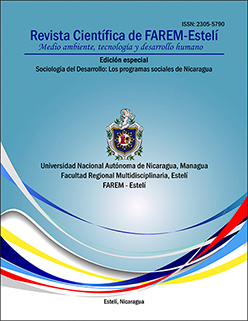Characterization of the Usura Cero program in the framework of the National Plan of Human Development of Nicaragua
DOI:
https://doi.org/10.5377/farem.v0i0.3113Keywords:
Nicaragua, development, microcredit, Usura Cero, PNDH.Abstract
This article presents in a general way the Problems of Development and Citizen Participation in Latin America, and in a deeper way the situation in Nicaragua. Before discussing this topic, a brief theoretical compilation about the development models that have been in force in the last decades in the region, its positive and negative effects, is presented. It is clear that different ways have emerged to achieve development and address inequality and poverty, in Nicaragua the Government of Reconciliation and National Unity (GRUN) has implemented Usura Cero, an economic strategy program consisting of microcredit for women. It works under the National Human Development Plan to promote the empowerment of women, and to fight against poverty. Usura Cero has an organizational strategy that has been evolving over the years, in order to restore the rights of people and promote integral and sustainable development, with an inclusive participation.
Downloads
1686
Downloads
Published
How to Cite
Issue
Section
License
© Revista Científica de FAREM-Estelí

